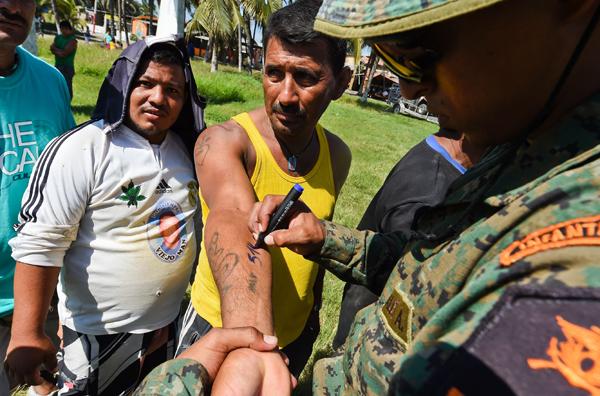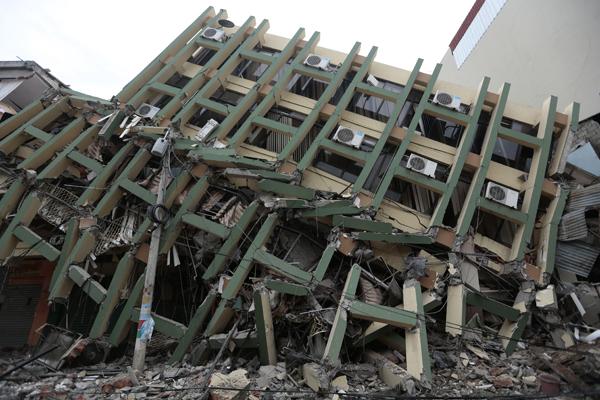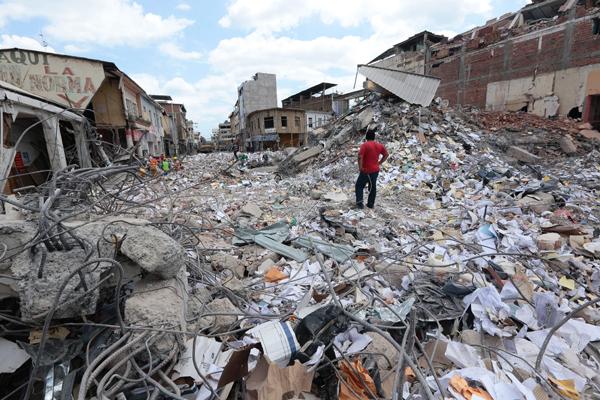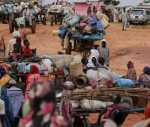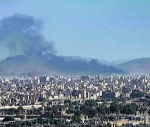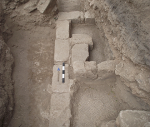You are here
Ecuador quake toll rises to 350; billions needed to rebuild
By Reuters - Apr 18,2016 - Last updated at Apr 18,2016

Picture taken in one of Ecuador’s worst-hit towns, Pedernales, a day after a 7.8-magnitude quake hit the country, on Sunday (AFP photo)
PEDERNALES/PORTOVIEJO, Ecuador — The death toll from Ecuador's worst earthquake in decades rose to 350 on Monday while traumatised survivors rested amid the rubble of their homes and rescuers dug for survivors in the Andean nation's shattered coastal region.
At least 2,068 people were also injured in Saturday's 7.8 magnitude quake, which ripped apart buildings and roads and knocked out power.
Giving the new tally of fatalities from the city of Portoviejo inside the disaster zone, President Rafael Correa told Reuters he feared the number would rise even further.
"Reconstruction will cost billions of dollars," he also said, chatting with victims and appearing deeply moved as he toured the shattered town in the OPEC nation whose economy was already reeling from the global slump in crude oil prices .
Further north, in the beach locality of Pedernales, survivors curled up on mattresses or plastic chairs next to flattened homes. Soldiers and police patrolled the hot, dark streets overnight while pockets of rescue workers plowed on.
At one point, firefighters entered a partially destroyed house to search for three children and a man apparently trapped inside, as a crowd of 40 gathered in the darkness to watch.
"My little cousins are inside. Before, there were noises, screams. We must find them," pleaded Isaac, 18, as the firemen combed the debris.
Tents sprang up in the town's still-intact stadium to store bodies, treat the injured, and distribute water, food, and blankets. Survivors wandered around with bruised limbs and bandaged cuts, while those with more serious injuries were evacuated to hospitals.
While the full extent of the damage remains unclear, the disaster is dreadful news for Ecuador's economy, which was already forecast for near-zero growth this year due to plunging oil income.
The energy industry appeared largely intact although the main refinery of Esmeraldas was closed as a precaution. However, exports of bananas, flowers, cocoa beans and fish could be slowed by ruined roads and port delays.
The quake could also alter political dynamics ahead of next year's presidential election.
The government's response seemed relatively speedy, with Vice President Jorge Glas flying into the disaster zone within hours and Correa coming straight back from a trip in Italy.
But some survivors complained about lack of electricity and supplies, and aid had still not reached some areas.
Aftershocks
About 230 aftershocks have rattled survivors, who huddled in the streets, worried the tremors could topple their already cracked homes.
"We're scared of being in the house," said Yamil Faran, 47, surrounded by some 30 people in a street in Portoviejo. "When ... the aftershocks stop, we're going to see if we can repair it."
About 130 inmates in Portoviejo took advantage of the destruction and chaos to climb over the collapsed walls of the low-security El Rodeo Prison. More than 35 had been recaptured, authorities said Sunday night.
On Monday, people swarmed into the middle of Portoviejo in search of any materials of value among destroyed buildings, including a social security office. Desks and papers lay strewn around as locals carried off aluminum window frames and cables.
"I have to take some advantage from this horrible tragedy. I need money to buy food. There's no water, no light, and my house was destroyed," said Jorge Espinel, 40, who works in the recycling business.
About 13,500 security personnel were mobilized to keep order.
Some $600 million in credit from multilateral lenders was immediately activated for the emergency, the government said.
Domestic aid funds were being set up and Venezuela, Chile and Mexico were sending personnel and supplies.
The Ecuadorean Red Cross mobilised more than 800 volunteers and staff and medical charity Medecins Sans Frontieres said it was sending a team from Colombia.
Two Canadians were among the dead. Jennifer Mawn, 38, and her 12-year-old son, Arthur, died when the roof of their coastal residence collapsed.
Residents on the Galapagos Islands, far off Ecuador's coast and home to numerous rare species, said they had not been affected by the quake.
The tremor followed two large and deadly quakes that have struck Japan since Thursday. Both countries are on the seismically active "Ring of Fire" that circles the Pacific, but the US Geological Survey says large quakes separated by such distances would probably not be related.
Related Articles
PEDERNALES, Ecuador — A magnitude 6.2 earthquake shook Ecuador's already devastated Pacific coast before dawn on Wednesday, terrifying resid
MANTA, Ecuador —The death toll from Ecuador's biggest earthquake in decades soared to at least 233 on Sunday as rescuers using tractors and
PEDERNALES, Ecuador — Ecuador announced drastic economic measures late Wednesday, including a hike in some taxes and mandatory wage contribu


